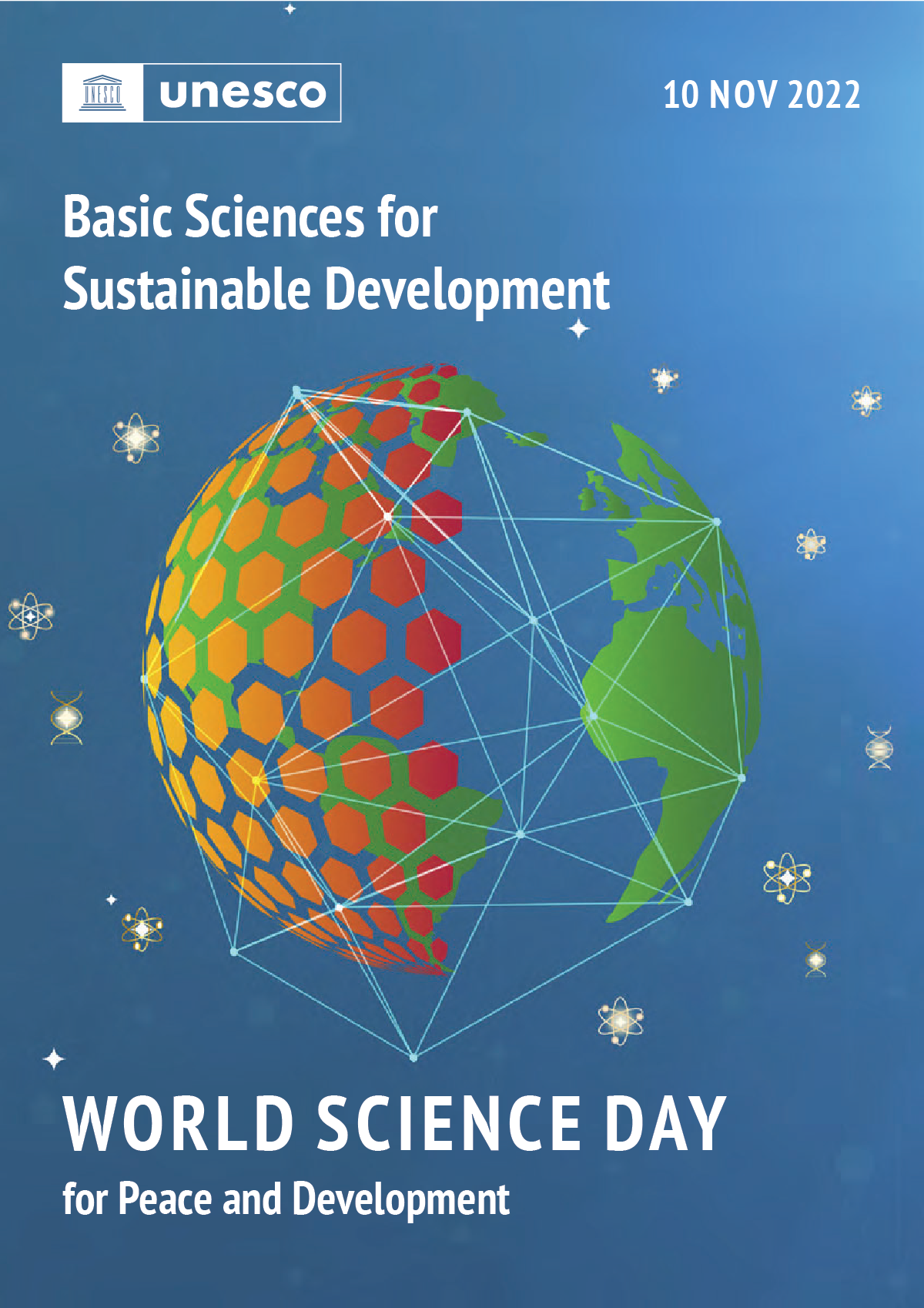World Science Day for Peace and Development
“At a time when humanity must invent new ways of producing, travelling and heating, we know we need the basic sciences and the potential they possess. More than ever, we must allow the basic sciences to expand in all directions in order to explore, investigate and experiment. For this capacity to imagine, innovate and discover will determine whether we are able to rise to the major challenges of our time.”
- Audrey Azoulay, Director-General of UNESCO
Tomorrow (November 10) is World Science Day for Peace and Development, a day established by the United Nations to recognize the importance of science in society and the need to inform the public about the relevance of science in their lives and to engage them in discussions on emerging scientific issues. This year’s theme “Basic Sciences for Sustainable Development” celebrates the need for the basic sciences to attain sustainable development and to improve the quality of life for people all over the world.
iGEM’s Sustainable Development Impact
In honor of World Science Day for Peace and Development, we’d like to highlight the nominees and winners of the Best Sustainable Development Impact award in the 2022 iGEM Competition:
Undergraduate Division
Cellucoat
Calgary (Canada) designed a preservative bacterial cellulose packaging that can extend the shelf life of fruit and replace current plastic packaging. 🏆 Winner Best Sustainable Development Impact award, Gold medalist, Undergrad Division.
Fisherly
HKUST (Hong Kong) created a colorimetric biosensor that detects bioamine levels in raw fish, which can be used to indicate the freshness of seafood products. Nominee Best Sustainable Development Impact award, Gold medalist, 2nd Runner-up Grand Prize, Undergrad Division.
FIAT LUX
INSA_Lyon1 (France) developed a biosynthetic tool "FIAT LUX" to understand and combat plant diseases and build more sustainable agricultural practices. Nominee Best Sustainable Development Impact award, Gold medalist, 1st Runner-up Grand Prize, Undergrad Division.
StarchLight
Ionis_Paris (France) designed a biological system "StarchLight" that converts brewers’ spent grain, a waste product of the beer brewing industry, into a power source. Nominee Best Sustainable Development Impact award, Gold medalist, Undergrad Division.
Silvanella
Nanjing-China (China) engineered bacteria that can synthesize and enrich silver nanoparticles for improving power generation of microbial fuel cells. Nominee Best Sustainable Development Impact award, Gold medalist, Undergrad Division.
Overgraduate Division
Netlantis
UCopenhagen (Denmark) combined spider silk with mussel foot protein to create fibers "Netlantis" that can be twinned into biodegradable fishing nets. 🏆 Winner Best Sustainable Development Impact award, Gold medalist, Grand Prize winner, Overgrad Division.
HESTIA
EPFL (Switzerland) engineered HESTIA (Hydrophobic E.coli-based Sustainable Thermally Insulative Aerogel), a fully biodegradable insulation material to save energy and reduce the environmental impact of insulation waste. Nominee Best Sustainable Development Impact award, Gold medalist, Overgrad Division.
Spyke
TUDelft (Netherlands) developed a device that combines the specificity of biomolecules with the reliability of electronics to detect the drug gamma-hydroxybutyric acid and protect people from drink spiking. Nominee Best Sustainable Development Impact award, Gold medalist, Overgrad Division.
Prochi
UFMG_UFV_Brazil (Brazil) engineered Lactobacillus acidophilus to produce and secrete chitinase, an enzyme that cleaves chiton, as a treatment for intestinal parasites. Nominee Best Sustainable Development Impact award, Gold medalist, Overgrad Division.
Pho-Bac
UniofBath (United Kingdom) developed "Pho-Bac", an engineered bacteria that releases phosphate in response to the plant phosphate stress signal malate, thereby acting as an ecologically sensitive biofertilizer. Nominee Best Sustainable Development Impact award, Gold medalist, Overgrad Division.
High School Division
hydroponic farming
PuiChing_Macau (Macao) engineered bacteria that can neutralize the pH and produce hormone binding proteins in hydroponic systems to increase the food supply. 🏆 Winner Best Sustainable Development Impact award, Gold medalist, 1st Runner-up Grand Prize, High School Division.
FabRevivo
GreatBay_SCIE (China) developed an innovative means of cloth recycling by engineering nanomachines that can convert cellulose into high-value textiles. Nominee Best Sustainable Development Impact award, Gold medalist, High School Division.
DNA Data Storage
Korea_HS (Korea) devised methods to ensure the stability of DNA to better implement DNA data storage. Nominee Best Sustainable Development Impact award, Gold medalist, High School Division.
UV-PRISMA
LINKS_China (China) engineered yeast to produce mycosporine-like amino acids, natural products from marine organisms able to absorb UV radiation, for creating an environmentally friendly sunscreen. Nominee Best Sustainable Development Impact award, Gold medalist, High School Division.
Pinesorb
Seoul_Korea (Korea) engineered bacteria to mass produce 4 types of cellulose-degrading enzymes to create “Pine-sorb”, an eco-friendly and biodegradable oil absorbent. Nominee Best Sustainable Development Impact award, Gold medalist, High School Division.
Congratulations to all of the iGEM 2022 teams who worked towards the UN Sustainable Development Goals by solving local problems and tackling global challenges using the tools of synthetic biology!
If you would like to join iGEM in addressing the UN Sustainable Development Goals, we invite you to form or join an iGEM team, become an iGEM partner or sponsor, and join us in witnessing the future of synthetic biology at the 2023 Grand Jamboree in Paris. We look forward to welcoming you to the iGEM community!






